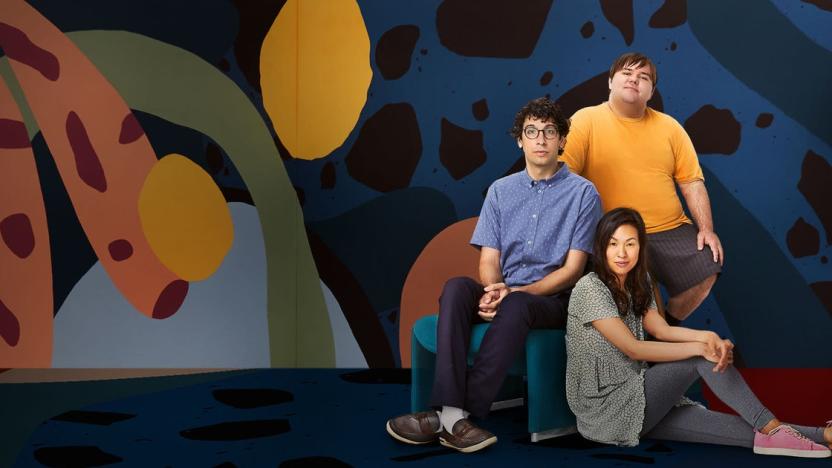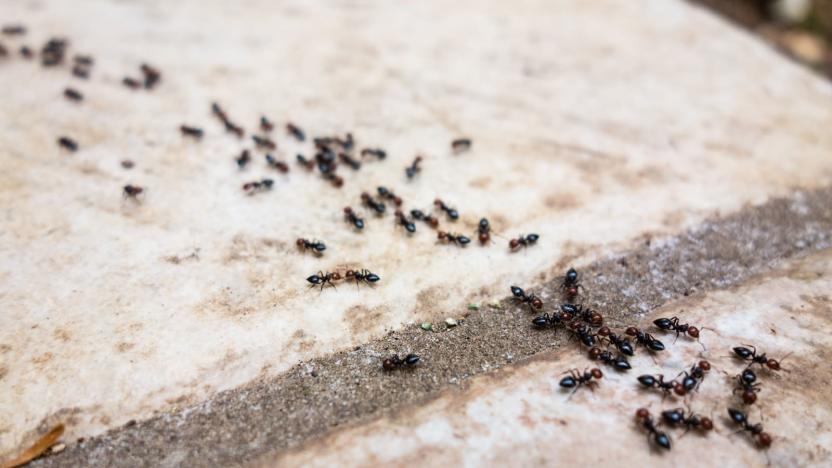autism
Latest

Amazon series starring actors on the autism spectrum debuts this week
The entire first season of 'As We See It' hits Prime Video on Friday.

Using Lego therapy for autism
There is no cure for autism spectrum disorder (ASD), which affects one out of every 59 children in the United States. One of its most common effects is difficulty with social interaction and everything it entails, like living independently and holding down a job. Children on the spectrum may avoid eye contact, have difficulty reading people's emotions via nonverbal signals and struggle to express their own emotions verbally.

New wristband could predict aggressive outbursts in people with autism
Researchers are hoping a new wearable wristband will help predict aggressive outbursts in people with autism. The device monitors heart rate, sweat production, skin surface temperature and arm movements. It can predict outbursts 60 seconds ahead of time with 84 percent accuracy. While that might not seem like much time, it could give caretakers an opportunity to relax the individual wearing the wristband and make sure everyone is safe.

Recommended Reading: Undercover moms battle autism 'cure' on Facebook
Parents are poisoning their children with bleach to 'cure' autism. These moms are trying to stop it. Brandy Zadrozny, NBC News Don't believe everything you read on the internet, especially in 2019. An autism "cure" is currently making the rounds in Facebook groups that advises parents to give children bleach to remedy the condition. This is completely untrue -- there is no cure for autism -- and some moms are going undercover to fight back.

Researchers use Google Glass to help kids with autism
We haven't heard from Google Glass since its newer, sleeker version came out in July 2017 with a focus on assisting in the workplace. But scientists have found another application for the search giant's augmented reality glasses: Helping autistic children navigate social situations.

AI can predict autism through babies' brain scans
Scientists know that the first signs of autism can appear in early childhood, but reliably predicting that at very young ages is difficult. A behavior questionnaire is a crapshoot at 12 months. However, artificial intelligence might just be the key to making an accurate call. University of North Carolina researchers have developed a deep learning algorithm that can predict autism in babies with a relatively high 81 percent accuracy and 88 percent sensitivity. The team trained the algorithm to recognize early hints of autism by feeding it brain scans and asking it to watch for three common factors: the brain's surface area, its volume and the child's gender (as boys are more likely to have autism). In tests, the AI could spot the telltale increase in surface area as early as 6 months, and a matching increase in volume as soon as 12 months -- it wasn't a surprise that most of these babies were formally diagnosed with autism at 2 years old.

Gene-altered ants show how animal societies work
How much is societal behavior dictated by genetics? Scientists at Rockefeller University might just find out through ant colonies. They've modified the genes of clonal raider ants (not shown above) to see how the changes affect social behavior, both individually and on a grander scale. Knocking out genes for odorant receptors leads to "lone wolf" ants who wander by themselves for days, for example. The team keeps track of these exceptions by painting the ants in such a way that computers can track them all day, spotting even slight deviations from the norm.

Trump taps anti-vaxxer to lead vaccine safety committee (updated)
It's become a common occurrence in the Trump transition team. The incoming administration has nominated a candidate so uniquely unqualified for their intended position that the nod can only be interpreted as a troll against the American people. We've already seen it in Ben Carson's selection as head of Housing and Urban Development, Betsy DeVos as Secretary of Education, Rex Tillerson's role as Secretary of State and Rick Perry's heading of the Energy Department. Now, Trump wants vaccine denier Robert Kennedy Jr. to chair a presidential commission on vaccine safety.

Gene-modified autistic monkeys could lead to a cure for humans
There's little doubt that gene editing could be one of the greatest advances in medical science, since it might let you "turn off" conditions. However, the way you test that editing is another challenge entirely -- and some scientists in China are pushing some boundaries to make it work. They've used genetic engineering to breed over a dozen macaque monkeys with a flawed gene that triggers a rare form of autism in humans. The hope is that researchers can not only study how brains function with this condition, but experiment with treatments that could be useful on people. Ideally, the researchers will use a gene editing system like CRISPR to eliminate the condition outright.

SwiftKey launches assistive app for users with special needs
SwiftKey released a new app on Thursday designed to give users with learning disabilities (those living with autism, for example) a non-verbal means of communication with friends and family. The app, called Symbols, allows these users to construct sentences using a series of images rather than words. It's driven by the same prediction engine that powers SwiftKey's popular keyboard app. What's more, Symbols also takes time and date into account when recommending specific symbols to further simplify routine communications. Plus, the app can be heavily customized to suit the user's specific needs including the addition of custom images and categories, speech-to-text and audio playback.

Apple introduces ResearchKit apps for autism, melanoma and epilepsy
Apple wanted to make data gathering easier for medical researchers with ResearchKit. According to the company, since the launch of the open-source platform earlier this year, over 100,000 participants have already shared their health data with a host of apps that study asthma, diabetes, breast cancer and more. The Kit's ever-increasing list of studies will now include autism, epilepsy and melanoma.

Samsung's 'Look at Me' app teaches autistic children to communicate
Autism is a developmental disorder that hampers a person's ability to communicate with people, but it's believed that its sufferers do enjoy using computers. It was from that spark that Samsung, working with two universities in Seoul, was inspired to craft an app that could train sufferers to communicate with people. Look At Me is, in essence, a series of short games that teach autistic kids to look at faces, read facial expressions and understand emotional responses. It's early days, but the small test group seems to have found a positive improvement, which is encouraging for the future. Look at Me is available for free on Google Play, and works with a raft of recent Samsung devices, including Galaxy S3, S4, S5, Note 2, 3 and 4 as well as the Zoom, Zoom 2 and the Tab S.

Google's putting autism genome research in the cloud
Remember when Google said it'd store your entire genome on its servers? Well, the outfit is putting that to good use and is teaming with advocacy group Autism Speaks to sequence the genomes of some 10,000 autism patients (and their family members). In case you're wondering why, it's so we can hopefully discover the disorder's genetic origins. As Wired notes, this would allow researchers to sort through the roughly 100GB -- per person -- of genetic data in a way that's similar to how we search for things online. Except, of course, the scientists would be looking for genetic commonalities in those with Autism rather than, say, leaked images of a new iPhone.

Where Are They Now? 2012 personalities, including the blind player and his 'guide dog'
At last, our look back at five years of WoW personality interviews rolls around to the duo everyone's been asking about: Hexu and Davidian, the British soldier blinded in Iraq and his redoubtable "guide dog" guildmate who steered him through full participation in current raid content. Their story exploded across the internet after we interviewed Davidian here on WoW Insider, and Blizzard recognized the dynamic duo with in-game helms with flavor text alluding to their inspiring bond of friendship. Hexu and Davidian are both still playing World of Warcraft -- but the duo is together no more. As of the new year, the ever-energetic Hexu has been raiding on a new rogue, Dirtypawz, in Unqualified on Stormrage (EU). "I know!" he replies to my unspoken exclamation of surprise and sadness. "It was just that people were only raid logging, and it got boring -- but it was all amicable and cool. I still speak to people in Die Safe. I just wanted to do more than raid three nights a week." Hexu/Dirtypawz says a "very nice bloke" named Vatic is serving as his current raiding "guide dog" helper. "The people in the guild are all nice people," he adds, "and there [are] always things going on." We'll visit with Hexu/Dirtypawz next month about how he's settling in and dig into his tips for the many sight-disabled players who've written to us during the past year trying to reach him for advice. Meanwhile, Davidian reports that the year since we interviewed him has been packed with recognition and encouragement. "The publicity was just unreal," he says. "Even to this day, I get people coming to our server just to say how much the story inspired them and restored their faith in the gaming community. The biggest thing of all, though, was the fact that it made its way to Blizzard, and myself and Ben got signed copies of the collectors edition of Cataclysm signed by at least 50 members of the Blizzard team, and [we] received in-game pets also. Then to top it off, having in-game items with our names on them was just outstanding -- I mean, to be immortal in a game that we love to play is just, well words couldn't possibly describe it." All good people connecting to play a game that's close to our hearts ... Keep reading for more updates about people who love World of Warcraft, from our interviews during 2012.

Well-known druid blogger Lissanna lowers the boom(kin) on autism research
It's only been a couple of weeks since we reported on the crowdsourcing effort to fund the autism research of well-known Restokin blogger and Blizzard MVP poster Lissanna, aka Dr. Elisabeth Whyte of the Laboratory of Developmental Neuroscience at Penn State. So far, supporters have boosted Dr. Whyte to just over a quarter of her funding goal for the project, which focuses on how children and adolescents with autism understand language and process information from faces (such as recognizing people or understanding emotional expressions). Her goal: designing a video game to help kids with autism improve these skills. How does an MMO-playing grad student transform from anonymous gamer to well-known WoW blogger, Blizzard forum MVP, and Ph.D.-level researcher bringing gamification to the treatment of autism? If you follow the example of this lady: with ease. WoW Insider: One-fourth of your funding already under your belt -- congratulations! Our readers already know that WoW can be beneficial to kids with autism, so it's exciting to hear about a gamification project designed to help kids with autism. Lissanna: Many kids and adults with autism seem to enjoy playing video games. We have some evidence that using fun activities can motivate learning. Our goal is to develop and test the efficacy of an educational game that impacts face processing abilities and social skills. With much of the research focused on important early intervention work, there is a huge gap in the services that individuals with autism can receive when they are older. We think that a sophisticated game can fill the need for social skills services targeting older individuals to help with tasks like preparing them for jobs or developing friendships with their peers.

Parents with questions may find guidance in Questioning Autism? app
It's the rare mom or dad who's never spent a sleepless night wondering "Is my kid OK?" Developmental issues, in particular, can be a nightmare to classify and confirm. Normal variations between children may mean that a milestone delay is nothing to worry about; for another child, when seen in context with other symptoms, that same delay may justify an evaluation by a professional. That's why the Questioning Autism? app for iPhone, released earlier this month, is an interesting and useful tool. With 12 straightforward educational questions, the app helps guide parents who may be concerned about a young child in preparing feedback and comments for a conversation with a pediatrician. It's not intended to diagnose autism or related disorders, but can help parents understand the signs and symptoms of autism. Parents can annotate each answer, so that their emailed or printed notes are available when discussing particular behaviors or incidents. At the end of the question panel, parents can tap through to web resources and further tools. The Questioning Autism? app is the brainchild of Brooklyn-based UX guru Michael McWatters, who tells the story of his own family's struggles at his ASD Dad blog. Michael and his wife have twin sons, one who has autism and one who is neurotypical. Their pediatrician dismissed their concerns about their son's developmental arc for some time, so Michael's blog is intended to help other parents combat the anxiety and isolation that may come with parenting a special-needs child. Although there are other screening apps for mental health, Questioning Autism? is distinguished by a few factors: it's free, it's gracefully designed, and it's drawing on the real-life experiences of a parent who has been through the challenges and frustrations of a child's autism spectrum diagnosis. You can download it or other apps from ActiveHealth Management on the App Store now. [hat tip Ditmas Park Corner]

Research: iPod touch benefits workers with autism
We often hear about iOS devices being used in schools and in the workplace, but a recent study from researchers at Virginia Commonwealth University shows how the device can be beneficial for those struggling with autism. The study was recently published in the the Journal of Vocational Rehabilitation and is part of a longer four-year study being conducted in conjunction with Virginia Career Support Services and the Virginia Department for Aging and Rehabilitative Services. The researchers used the iPod touch with three working adults who were diagnosed with the developmental disorder. Each person was given an iPod that was configured with apps to help them perform tasks at their job. The apps included reminders, progress trackers and music to calm them when they got frustrated. The trio were followed by an occupational therapist and a job coach during their time with their device. In two cases, the people improved their job performance and required less assistance from their job coach. In another case, the individual was able to navigate safely to and from work. The study had a small sample size, so you can't pull out too many conclusions from the results. It does, however, suggest that an iPhone, iPad or iPod touch may be beneficial as an assistive device for those with disabilities. You can read more about the study in the article on Disability Scoop. [Via Disability Scoop]

Ask Engadget: best tablet, software and case for a child with a developmental disorder?
We know you've got questions, and if you're brave enough to ask the world for answers, here's the outlet to do so. This week's Ask Engadget inquiry is coming to us from is from Kim, who wants to help her four-year-old play games and communicate in the home. If you're looking to send in an inquiry of your own, drop us a line at ask [at] engadget [dawt] com. "I'm looking at getting a tablet for my four-year-old, developmentally delayed daughter. She uses an iPad with her therapist to play games and say what she wants, but I'm not sure if I should get the same for the home. Is there an Android alternative that's as useful in our special circumstances, and is it compatible with a sturdy, water-proof case for it?" For our two cents, we'd say that in such circumstances, continuity is probably an important factor to take into account. However, we're also aware that some of the specialist apps run into the hundreds of dollars, which few can easily afford, so let's turn the question over to our community. Do you have experience in the area, or perhaps you've already been in this situation? Either way, why not share what you know?

Teacher uses SWTOR to connect with autistic student
Through Reddit comes one of those truly touching stories that show us just how video games can and do make a difference for the better in the real world. Special Ed teacher Lyobel was having difficulties connecting with an autistic student. After learning that the student was into Star Wars and Star Wars: The Old Republic, she went to Reddit to ask for help in mastering the lingo and game. With her new-found knowledge, Lyobel met her student in SWTOR and found that he opened up through this medium: "This was after all a kid who for the last six months hadn't talked to anyone except over a computer, hadn't left the room except for food and toilet for the same amount of time, and had kicked out and ignored the last teacher to enter his domain. But aha! He is PvPing! And by the looks of it, he is getting his ass kicked. 'Get out of line of sight!' I shout, smoothly positioning myself next to him so I can see better. It looks slightly humorous while he runs around a rock, and when he dies I proclaim a masterful 'stupid smugglers!' Now, I'm not entirely sure if it was a smuggler that killed him, but the ice is broken, and as he runs back for revenge he starts telling me about how long he played, why he is on the dark side, and how the server is PvP-wise. Seriously! We didn't shut up! When the PvP was over, he handed in a few quests, logged out, and focused on my tasks. I hadn't brought much, to keep the first time short and sweet, but when that was done we talked about dogs, games, and made a plan for our next lesson." BioWare caught wind of this story and sent both the teacher and student posters signed by the dev team. [Thanks to Soeren for the tip!]

Miami zoo orangutans use iPads to communicate
iPads are everywhere, even in the orangutan cages at Miami's Jungle Island. As reported by Fox News, the Florida zoo is experimenting with iPads and using them to communicate with their apes. The apes are using a graphics-rich app designed to communicate with autistic children. Not surprisingly, it's the younger apes that are most adept at picking up the iPad, while the older ones just ignore it. Linda Jacobs, who oversees the iPad project, is excited by the possibility of letting other people communicate with the zoo's orangutans, Currently, only those trained in the ape's sign language can effectively communicate with the animals. Now that the orangutans are armed with iPads, they can talk to untrained personnel and maybe even interact with park visitors.












